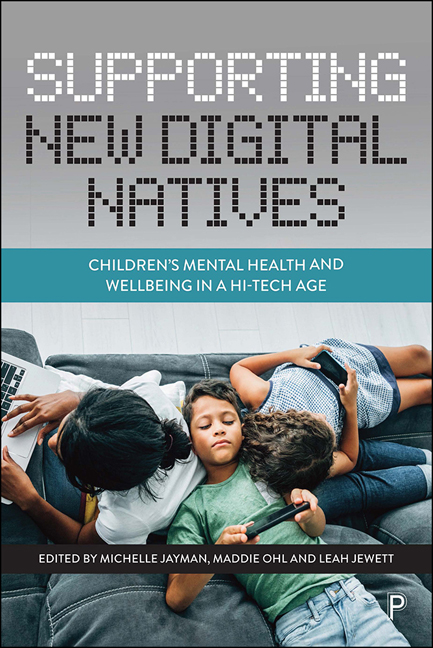Book contents
- Frontmatter
- Dedication
- Contents
- List of figures and tables
- Glossary
- Notes on contributors
- Foreword
- Preface
- 1 Digital lives: growing up in a hi-tech world and staying mentally healthy
- 2 Pyramid Club: building skills for healthy friendships and relationships in a digital age
- 3 Supporting children’s healthy socio-emotional development through play: Book of Beasties – the mental wellness card game
- 4 The School Counselling Partnership: providing support and promoting self-care for school communities
- 5 The Breeze Project: supporting children and young people through Forest School
- 6 Promoting the mental health of girls and young women in the community: the role of Girlguiding
- 7 Supporting families to navigate the changing sex-education landscape: Outspoken Sex Ed
- 8 The Lift Off programme by Red Balloon: online learning and wellbeing support for children who self-exclude from school
- 9 The LifeMosaic project: supporting wellbeing and empowering pupils through design, development and research
- 10 Building better mental wellbeing for children: rebel thinking and innovative practice
- Index
6 - Promoting the mental health of girls and young women in the community: the role of Girlguiding
Published online by Cambridge University Press: 13 May 2022
- Frontmatter
- Dedication
- Contents
- List of figures and tables
- Glossary
- Notes on contributors
- Foreword
- Preface
- 1 Digital lives: growing up in a hi-tech world and staying mentally healthy
- 2 Pyramid Club: building skills for healthy friendships and relationships in a digital age
- 3 Supporting children’s healthy socio-emotional development through play: Book of Beasties – the mental wellness card game
- 4 The School Counselling Partnership: providing support and promoting self-care for school communities
- 5 The Breeze Project: supporting children and young people through Forest School
- 6 Promoting the mental health of girls and young women in the community: the role of Girlguiding
- 7 Supporting families to navigate the changing sex-education landscape: Outspoken Sex Ed
- 8 The Lift Off programme by Red Balloon: online learning and wellbeing support for children who self-exclude from school
- 9 The LifeMosaic project: supporting wellbeing and empowering pupils through design, development and research
- 10 Building better mental wellbeing for children: rebel thinking and innovative practice
- Index
Summary
This chapter will look at how the Girl Guides movement, and Girlguiding UK specifically, has embraced the opportunities and dealt with the challenges of the digital age and how it supports and promotes the mental health and wellbeing of girls and young women (GYW) through its network of volunteer leaders and its programme of relevant, fun but challenging activities.
The Girl Guides movement has responded to local need and culture but has at its core a common set of beliefs about the need to improve the lives of GYW through social action, self-development, leadership, female friendship and fun. The World Association of Girl Guides and Girl Scouts (WAGGGS) is a girls-only movement spanning 150 countries and including 10 million girls. WAGGGS’ aim is to empower GYW to develop the skills and confidence to make positive changes in their own lives, in their community and in their country. As Dua, a 13-year-old from Pakistan describes:
Being a part of Girlguiding is something else, especially living in a country with issues around women's rights. My favourite part of Guiding is how it empowers girls and shapes us into better versions of ourselves. It teaches us to love our sisters and stand up for what is right. But most importantly, it teaches us to believe in ourselves. I have heard numerous stories of people transformed through Guiding, including being encouraged to speak out and never give up hope. (WAGGGS, 2020a)
WAGGGS uses digital technology to improve the lives of girls in a number of ways, including a partnership with GenU and UNICEF's U-Report (WAGGGS, 2020b), a free social media tool that allows local young reporters to use online polling to capture and report the views of under-represented groups in their community. The results of the polls can be analysed by gender, age and country in real time, allowing young people to connect with their political representatives and to influence the work of organisations like UNICEF. In Rwanda there is an initiative to review what girls would like to see from the Guiding programme and to establish more local Guide groups in secondary schools to support young people with disabilities, showing how technology can be used to improve the quality and relevance of face-to-face work.
- Type
- Chapter
- Information
- Supporting New Digital NativesChildren's Mental Health and Wellbeing in a Hi-Tech Age, pp. 97 - 114Publisher: Bristol University PressPrint publication year: 2021

